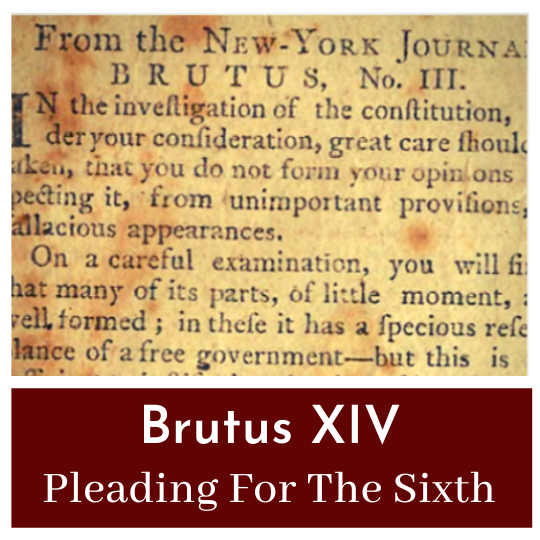Outlining the Sixth Amendment - Brutus XIV
In Brutus XIV, an Anti-Federalist author makes arguments that would directly lead to the 6th Amendment to the Constitution.
Brutus XIV
February 28, 1788
Brutus XIV begins with an anonymous author (probably Robert Yates) acknowledging that the Supreme Court is the right place for ambassadors and diplomats to receive trial.
He then turns his attention to criminal law, pointing out that appeals trials for criminal cases are new and unjust.
The language used in the Paper is extremely similar to that in the 5th and 6th Amendments.
Pleading the 5th
Brutus points out that giving prosecutors the ability to appeal criminal cases meant that people could continue being tried for the same crime over and over again.
He argues that the original case should be considered fair, so why should prosecutors have a second shot?
These ideas rang true and found their way into the 5th Amendment in the Bill of Rights.
While we usually remember ‘pleading the fifth’ as a means to not implicate oneself, it also includes the right that “No person shall...be subject for the same offense to be twice put in jeopardy of life or limb…”
Pleading the 6th
Brutus then goes on to put forward so many topics that found their way into the Bill of Rights, it would be easiest to compare his quote side by side with the 6th Amendment:
Brutus:
“They may be kept in long and ruinous confinement, and exposed to heavy and insupportable charges, to procure the attendence of witnesses, and provide the means of their defence, at a great distance from their places of residence.”
6th Amendment:
“In all criminal prosecutions, the accused shall enjoy the right to a speedy and public trial, by an impartial jury of the state and district wherein the crime shall have been committed, which district shall have been previously ascertained by law, and to be informed of the nature and cause of the accusation; to be confronted with the witnesses against him; to have compulsory process for obtaining witnesses in his favor, and to have the assistance of counsel for his defense.”
It is striking how Brutus says essentially the same thing in more concise, everyday language.
If you would like to read the original text of Brutus XIV, click here to get it for FREE.
This series is only part of my regular publications, so…
If you want to keep up with all the Founders, make sure you subscribe to my daily newsletter here:
Here is a link to the earlier Essays of Brutus I have covered:





